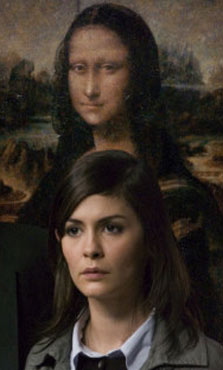
Ron Howard earned a lot of cool capital with the late “Arrested Development”. No matter how mediocre his films have been over the years, they were forgotten in the glory of his narration of that epic sitcom. For once his production company, “Imagine”, lived up to its name; Howard acquired an air of clever risk-taking. Maybe just a whiff, but it was something. With “The Da Vinci Code” Howard squanders his hard-won cache of cool as quickly as George W. Bush wiped out the federal budget surplus. Howard and his people have been told they’ll go to hell for this film, and in a way they will. Whichever hell turns out to be worse—the eternity of DVD shelf-life for this abomination or the permanent linking of his name with Dan Brown’s—the awful duration of his shame is incredible to contemplate. But at every step through this minefield of boneheaded implausibilities and open contempt for the mind, pity for Howard quickly dissolves until damnation seems too kind a fate.
My catalog of Howard’s infamy will be limited to one sequence. We open in The Louvre, where the curator is on the run from an albino monk who is only slightly less creepy and persistent than a Scientology recruiter. He is cornered and killed, shot in the belly by the monk. Shortly afterward, Robert Langdon, a regular-schmoe historian, is summoned to the crime scene by the French police. We sense that the lead detective, Fache, believes Langdon killed the curator. But another cop, Sophie, arrives just in time to arrange for Langdon to escape the frame-up. She tricks Fache into letting her take Robert to the bathroom, where I hoped she was going to point out to Robert that Harvard professors don’t have mullets. Instead she shows Robert that he is bugged and tosses the device out the window where it falls into the back of a trash truck which happens to be driving by one of the Louvre’s bathrooms. The cops instantly take off in pursuit, leaving only one man behind. Sophie and Robert wait for the one remaining cop to leave the crime scene—in the still-darkened museum—who all but yawns as he leaves to start his normal nightly rounds, as if every day started with a murder.
A few blocks away the police pursue their prey, the horsepower of those funny French cruisers put to the test by the blazing speed of a trash truck racing through traffic. Even after they’ve stopped the truck, they spend several minutes determining that Sophie and Robert are not actually hiding beneath two tons of raw garbage. Meanwhile the fugitives, back at the Louvre, find themselves engaged in solving a puzzle the dead curator has left them to solve. This eminent intellectual, wishing to communicate his secrets only to Robert, has used dizzingly clever methods of concealment such as anagrams and black-light ink. Such riddles make solving the back page crossword of USA Today Weekend look like cracking the Rosetta Stone. Once solved by Robert—without a Cracker Jacks decoder ring or a magic 8 ball, no less—the anagrams lead them to another Da Vinci painting. Is this where the curator has hidden his treasure? Robert catches Sophie’s glance, then looks at his feet to draw her and our attention to a few spots of blood at the foot of the painting. “He was here”, Hanks’ eyes gravely say.
We are left to conclude that a man shot in the belly, suffering a fatal and messy wound, staggered through the museum carefully writing out clues for Sophie and Robert so that they, and only they, will find his key—without bleeding on the floor except in the one spot where he hid the key. Even this absurd: this dying man has taken pains to mystify the police and leave a trail for those clever enough to figure it out, yet one of his markers is a splatter of blood on the otherwise spotless floor of a museum? And the two leads discover all this thanks to a diversion tactic so lucky it would be an act of Christian charity to call improbable?
Five minutes into this wretched movie, Howard and his screenwriters have punctured the air of intellectual mystery and chase-movie adventure so thoroughly there is nothing left to do but laugh to keep from crying. Never mind the controversial ‘theology’ of “The Da Vinci Code”. Our intelligence is already insulted to the point of distracted incredulity. By the time Langdon tells Sophie that, though she is the descendant of Jesus Christ, the meaning of her divine lineage is really “whatever” she wants it to mean, I had no more groans to give. (Or so I thought; I had yet to sit through the scattered applause at the Times Square screening I attended.) As for the film’s alleged ‘heresy’, well, Church leaders ought to consider the punishment rendered. I won’t go to hell for having watched “The Da Vinci Code”, watching it was hell itself. |